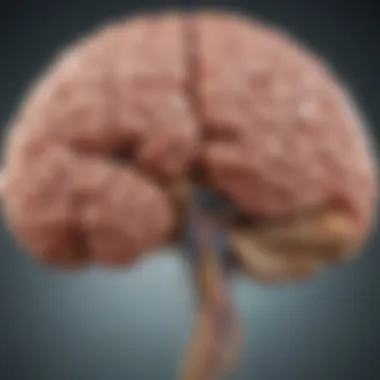Comprehensive Analysis of Muscular Sclerosis


Intro
Muscular sclerosis is a term that often creates confusion due to its similarity to multiple sclerosis, a separate neurological disorder. Understanding the nuances of muscular sclerosis requires a deep dive into its symptoms, causes, and potential treatment options. In this article, we will explore the complexities surrounding this condition, offering insights that are particularly valuable for students, researchers, educators, and professionals in the medical field.
This examination not only seeks to broaden familiarity with muscular sclerosis but aims to elevate the discourse surrounding neurological health. The implications of this condition can be profound, influencing how individuals navigate their daily lives and manage their overall well-being. Through an analytical lens, we hope to offer clarity to an often misunderstood area of study.
Methodology
Overview of Research Methods Used
To ensure a comprehensive understanding of muscular sclerosis, a combination of qualitative and quantitative research methods is utilized. This includes literature reviews of existing studies, clinical trials involving patient outcomes, and observational studies that capture the lived experiences of those affected by muscular sclerosis.
Studying both the physiological and psychological dimensions is crucial. Engaging with medical professionals and patients provides a well-rounded perspective and ensures that various viewpoints are considered.
Data Collection Techniques
Data collection involves several techniques, including:
- Surveys and questionnaires filled out by patients and caregivers.
- Case studies from medical literature that highlight specific instances of muscular sclerosis.
- Interviews with neurologists and other healthcare professionals.
- Analysis of historical data on muscular sclerosis prevalence and trends.
These methods help illuminate the multifaceted nature of the condition, leading to a more robust understanding of how it presents and affects different populations.
Future Directions
Upcoming Trends in Research
Current research trends indicate a growing interest in personalized medicine approaches for muscular sclerosis. Advances in genetic profiling and precision treatment strategies hold promise for more effective management and tailored interventions.
Additionally, there is an increasing focus on the integration of mental health care within treatment plans. This approach recognizes the psychological burden faced by patients and looks to provide comprehensive support.
Areas Requiring Further Investigation
Despite ongoing research, several areas still need exploration:
- The underlying biological mechanisms of muscular sclerosis need further elucidation.
- The long-term outcomes of various treatment approaches remain unclear and warrant thorough investigation.
- The impact of lifestyle factors, such as diet and exercise, on the progression of muscular sclerosis requires more rigorous inquiries.
End
Understanding muscular sclerosis is vital for advancing neurological health. By employing robust research methods and exploring future directions, we can better inform care strategies and enhance the quality of life for those affected. The insights gained from this analysis will serve as a foundation for ongoing exploration and support within this essential field of study.
Defining Muscular Sclerosis
Defining muscular sclerosis is crucial for understanding the complexities of this neurological disorder. Muscular sclerosis, commonly known as multiple sclerosis (MS), affects millions globally. The examination of this condition not only provides insight into its medical aspects but also informs the societal and personal implications for those diagnosed.
Overview of the Condition
Muscular sclerosis is a chronic disease characterized by the immune system attacking the central nervous system. This leads to inflammation and damage to the myelin sheath that protects nerve fibers. The resulting disruption in communication between the brain and body can lead to a wide variety of symptoms, which may fluctuate over time.
Common symptoms include fatigue, difficulty walking, numbness, and problems with coordination. The disease can manifest in different forms, including relapsing-remitting, primary progressive, and secondary progressive.
Distinction from Similar Disorders
It is essential to differentiate muscular sclerosis from other neurological disorders, such as amyotrophic lateral sclerosis (ALS) and Parkinson’s disease. While all these conditions impact motor and neurological functions, their mechanisms, progression, and specific symptoms differ substantially.
- Amyotrophic Lateral Sclerosis (ALS): Unlike MS, ALS primarily affects motor neurons and leads to muscle weakness and atrophy without the characteristic autoimmune response present in MS.
- Parkinson's Disease: This condition is primarily associated with the degeneration of dopamine-producing neurons, leading to tremors and rigidity, while MS features demyelination and a range of sensory and motor symptoms.
Both accurate diagnosis and differentiation from similar disorders is crucial for effective treatment and management of muscular sclerosis.
A thorough understanding of these distinctions can enhance both patient outcomes and the development of targeted interventions, thus underscoring the importance of clearly defining muscular sclerosis.
Pathophysiology of Muscular Sclerosis


The pathophysiology of muscular sclerosis is a critical area of investigation. Understanding the underlying processes of this condition is essential for developing appropriate treatments and management strategies. Muscular sclerosis, also known as multiple sclerosis, involves a complex interplay of factors leading to significant neurological impairment.
Understanding Myelin Sheath Damage
The myelin sheath is a protective covering that surrounds nerve fibers in the central nervous system. In muscular sclerosis, the immune system mistakenly attacks this myelin, leading to inflammation and demyelination. This damage disrupts the normal conduction of electrical impulses along the nerves, resulting in various neurological symptoms.
The mechanisms of myelin damage include:
- Immune-mediated processes: The body’s immune system generates specific T-cells that attack the myelin sheath.
- Cytokine release: Inflammation mediators, like cytokines, contribute to myelin destruction and further nerve injury.
- Oligodendrocyte impairment: Oligodendrocytes are the cells responsible for producing myelin. Their damage hinders the repair process of the myelin sheath.
This myelin injury results in a range of functional impairments depending on the areas impacted. Symptoms can vary widely, reflecting the unpredictable nature of the disease.
Neuronal Implications
The implications of neuronal damage in muscular sclerosis extend beyond myelin loss. Neurons themselves can be affected, leading to permanent neurological deficits. The degeneration of neurons can occur through:
- Axonal loss: Damage to the nerve fibers can lead to neuronal death. The loss of axons correlates significantly with disability progression.
- Synaptic dysfunction: The disruption in communication between neurons can lead to cognitive impairment and mood disturbances.
- Neuroplasticity reduction: The ability of the brain to adapt to injuries diminishes, affecting recovery potential.
Altogether, the pathophysiology of muscular sclerosis underpins the multifaceted nature of the disease. Understanding this complexity is vital for researchers and healthcare professionals to create effective intervention strategies and improve patient outcomes.
Etiology and Risk Factors
Understanding the etiology and risk factors of muscular sclerosis is crucial for grasping the complexities of the condition. Different elements contribute to the onset of muscular sclerosis. Investigating these factors provides insights into prevention and risk management. Certain individuals may be more susceptible due to their genetic background or environment. By comprehensively analyzing these elements, we can better equip patients, healthcare providers, and researchers in dealing with muscular sclerosis.
Genetic Predispositions
Genetic factors play a significant role in the development of muscular sclerosis. Some people have a higher risk due to inherited genes. Research shows that specific alleles, like the HLA-DRB1 gene, increase susceptibility. Family history is also an important aspect. If a close relative has muscular sclerosis, the likelihood of developing the disease increases. However, genetics alone do not determine outcomes. It is essential to consider interactions between various genes and environmental elements.
Environmental Influences
Environmental influences also contribute to the risk of developing muscular sclerosis. Factors such as geographical location, vitamin D levels, and exposure to infections can increase risk. For instance, individuals living in temperate climates tend to have higher rates of muscular sclerosis. This suggests that sunlight exposure and vitamin D might play a protective role. Meanwhile, certain viral infections, like Epstein-Barr virus, have been linked to the onset of the condition. Thus, understanding these environmental risk factors is fundamental for prevention and intervention strategies.
"The interplay between genetic and environmental factors creates a unique landscape for each individual, illustrating the complexity of muscular sclerosis."
Clinical Manifestations
Understanding the clinical manifestations of muscular sclerosis is essential for effective diagnosis and management. These manifestations not only inform the health care providers about the progression of the disease but also guide treatment strategies. The impact of muscular sclerosis varies among individuals, leading to a complex array of symptoms that can shift in severity over time. Recognizing these manifestations helps in tailoring care and improving quality of life for those affected.
Motor Symptoms
Motor symptoms are often the most recognized signs of muscular sclerosis. These symptoms can range from mild weakness to significant impairments in mobility. Patients may experience muscle spasticity and increased fatigue, which can drastically affect daily activities.
Common motor symptoms include:
- Weakness: This may affect specific limbs, often leading to difficulties in standing or walking.
- Spasticity: Involuntary muscle tightness can make movement challenging and painful.
- Coordination Issues: Fine motor skills may decline, impacting tasks such as writing or buttoning clothing.
Therapeutic approaches often involve physical rehabilitation to address these symptoms, helping patients gain strength and improve function.
Sensory Symptoms
Sensory symptoms play a significant role in the experience of muscular sclerosis. Many individuals report issues with vision, sensation, and balance.
Some common sensory symptoms are:
- Numbness or Tingling: This can occur in various body parts, often manifesting as pins and needles.
- Visual Disturbances: Blurred or double vision can result from optic neuritis, a common occurrence in muscular sclerosis.
- Balance Problems: Difficulty in maintaining balance may lead to increased risk of falls, emphasizing the need for fall prevention strategies.
Understanding these symptoms is crucial for both the patient and the healthcare team, as they can significantly affect overall functionality.
Cognitive and Emotional Effects
Cognitive and emotional effects represent another dimension of muscular sclerosis that is often overlooked. Cognitive dysfunction may include memory issues or challenges with concentration. These effects can greatly impact daily life, including occupational functionality and social interactions.
Furthermore, patients frequently experience emotional challenges such as:


- Depression: This can stem from both the physical limitations caused by muscular sclerosis and the psychological burden of living with a chronic illness.
- Anxiety: The unpredictability of symptom flare-ups can lead to heightened anxiety levels.
Emotional wellbeing is important, and healthcare providers must assess these factors alongside physical symptoms. Psychological support interventions can play a vital role in addressing these issues, helping patients manage stress and emotional challenges effectively.
Diagnostic Approaches
The diagnostic approaches for muscular sclerosis are paramount in ensuring accurate identification and subsequent management of the condition. Early and precise diagnosis can significantly influence treatment decisions, subsequent patient education, and the overall quality of life for individuals affected. Effective diagnostic techniques help distinguish muscular sclerosis from other disorders with overlapping symptoms. This clarity is essential in providing appropriate therapeutic measures, which improve prognosis.
Clinical Assessment Techniques
Clinical assessment techniques for muscular sclerosis start with a thorough medical history. Physicians dive into the patient's symptoms, family history, and any significant prior medical conditions. This initial evaluation often includes a physical examination to assess the patient's motor and sensory functions. Common tests evaluate coordination, balance, strength, and reflexes.
Other tools include functional assessments such as the Expanded Disability Status Scale (EDSS). The EDSS gives a scoring system that reflects disability levels and aids in tracking changes over time. These clinical assessments are crucial, as they set the stage for advanced diagnostic procedures.
Neuroimaging Tools
Neuroimaging tools play a crucial role in diagnosing muscular sclerosis. Magnetic Resonance Imaging (MRI) is the most pivotal method used to visualize brain and spinal cord lesions, which are hallmarks of the disease. MRI can reveal the presence of demyelinated areas, which further supports the diagnosis after initial clinical assessments.
In some cases, other imaging techniques like Computed Tomography (CT) scans may be employed. However, MRI remains the preferred imaging modality due to its superior resolution for soft tissue detail.
It is important to understand that while neuroimaging aids diagnosis, it must be contextualized within the clinical picture, making multidisciplinary evaluation vital.
Laboratory Investigations
Laboratory investigations serve as an adjunct to clinical assessments and imaging for patients suspected of having muscular sclerosis. Key tests often measure the levels of specific proteins in the cerebrospinal fluid. An example includes the examination for oligoclonal bands, which indicates an immune response within the central nervous system.
Blood tests can also aid in ruling out other conditions and verifying the health of the patient overall. While laboratory investigations are less definitive than neuroimaging, they provide valuable supplementary data that contribute to a comprehensive diagnosis.
Accurate and timely diagnosis of muscular sclerosis can fundamentally alter a patient’s disease trajectory. Thorough clinical assessments coupled with advanced imaging and laboratory investigations ensure a holistic approach to diagnosis.
Treatment Modalities
Understanding treatment modalities for muscular sclerosis is crucial for managing the condition effectively. These modalities encompass various strategies designed to alleviate symptoms, improve quality of life, and slow the progression of the disease. Emphasizing a multifaceted approach is essential, as different individuals respond uniquely to treatments. The aim here is not only to provide options but also to evaluate their benefits and the considerations that may affect their use.
Pharmacological Treatments
Pharmacological treatments form a cornerstone in managing muscular sclerosis. These drugs aim to modify the disease course, manage symptoms, and enhance overall well-being. Medications such as interferons, glatiramer acetate, and newer oral treatments like dimethyl fumarate play a significant role in reducing the frequency and severity of relapses.
Moreover, corticosteroids are commonly prescribed to mitigate inflammation during acute exacerbations. This can offer symptomatic relief and potentially limit neurological damage. Some patients may also benefit from off-label use of other drugs, such as antispasticity agents or pain management medications.
The goal of pharmacological interventions is to alleviate symptoms and slow progression, thus sustaining the patient's quality of life.
Physical Rehabilitation Strategies
Physical rehabilitation strategies encompass tailored exercise programs and physical therapy. These strategies are vital for maintaining mobility and independence. Strengthening exercises aim to improve muscle function and prevent atrophy, while flexibility exercises can alleviate musculoskeletal stiffness.
Occupational therapy often assists patients in adapting daily activities, ensuring they can perform tasks more effectively. Aquatic therapy presents another beneficial avenue as it reduces stress on joints while providing resistance training, which is ideal for those with mobility issues.
Psychological Support Interventions
Psychological support interventions are essential as muscular sclerosis can significantly impact mental health. Patients might experience anxiety, depression, or cognitive challenges. Counseling and cognitive-behavioral therapy can offer coping strategies and emotional support.
Support groups provide a platform for shared experiences, reducing feelings of isolation. These interventions can be vital in fostering resilience and promoting a sense of community among individuals living with this diagnosis. Mental health professionals can guide patients through coping mechanisms specifically tailored for chronic illness, thereby enhancing overall mental wellness.
Living with Muscular Sclerosis
Living with muscular sclerosis involves unique challenges and adaptations that affect many aspects of a person's life. Understanding this topic is vital for fostering resilience, offering support, and enhancing quality of life for those affected. By exploring daily life considerations and support networks available, individuals can better navigate their experiences with this condition and make informed decisions regarding their care and lifestyle.
Daily Life Considerations
Individuals living with muscular sclerosis often need to rethink their daily routines. The condition can cause physical symptoms that hinder mobility and overall function. Careful planning can help manage these limitations.
- Energy Management: Fatigue is a common symptom. It is important for individuals to pace their activities, balancing exertion with rest. This might involve prioritizing tasks and using assistive devices when necessary.
- Dietary Choices: A well-rounded diet is essential. Certain foods can influence inflammation levels. Consulting a nutritionist may offer personalized advice tailored to individual health needs.
- Exercise Regimen: Regular, gentle exercise can maintain strength and flexibility. Engaging in activities like swimming or yoga can be beneficial. Professionals often recommend tailored physical therapy programs to address specific challenges.
- Home Modifications: Adapting living spaces can ensure safety and accessibility. Simple changes, such as installing grab bars and ensuring adequate lighting, improve comfort and reduce the risk of falls.


Support Networks and Resources
Building a support network is crucial for people with muscular sclerosis. Connection with others who share similar experiences fosters a sense of belonging and understanding. Here are some key resources:
- Support Groups: Local or online support groups can provide emotional support and practical advice. These groups encourage sharing of personal experiences and coping strategies, which can empower individuals.
- Healthcare Providers: Access to neurologists and other specialists is important for effective disease management. They can offer guidance tailored to the unique progression of one's condition.
- Online Platforms: Websites like Reddit or Facebook host communities where individuals can discuss challenges and solutions. These platforms also provide the opportunity to learn about the latest research and treatment options.
- Educational Resources: Organizations dedicated to muscular sclerosis raise awareness and share research findings through pamphlets, workshops, and online materials. Engaging with these resources can enhance understanding of the condition.
"Finding a support network not only connects you with helpful resources but also creates a community where shared experiences can lead to new insights and strategies for managing life with muscular sclerosis."
Research Advances
Research advances in muscular sclerosis are crucial for understanding the nuances of this complex neurological condition. Continuous research brings new insights, ultimately leading to improved patient outcomes and management strategies. It is essential to highlight the implications of ongoing studies, including their impact on diagnosis, treatment, and overall patient care.
Current Clinical Trials
Clinical trials serve as a foundation for developing new treatments. Researchers focus on various aspects, from novel drug therapies to innovative rehabilitation techniques. For instance, trials such as the Mavenclad and Ocrevus studies explore the efficacy of these drugs in reducing relapse rates in patients with relapsing forms of muscular sclerosis. The participation of patients in these studies also provides critical data on the long-term effects of treatment options.
Benefits of participating in clinical trials include:
- Access to new therapies before they become widely available
- Intensive monitoring and support throughout the study
- Contributing to the advancement of medical knowledge
Ongoing trials not only assess the effectiveness of new medications but also evaluate lifestyle factors and their impact on disease progression. For example, trials exploring the benefits of dietary interventions or exercise regimens have gained attention in recent years. This multifaceted approach indicates a shift towards more holistic patient care in muscular sclerosis treatment.
Future Perspectives in Treatment
The future of treatment for muscular sclerosis holds significant promise. Innovations in precision medicine are at the forefront of research. These advancements seek to tailor treatments to individual genetic profiles, potentially enhancing efficacy and minimizing side effects. Gene therapy represents another exciting avenue, aiming to address the genetic factors that contribute to the disorder.
Emerging therapies, such as biological agents and neuroprotective agents, show potential in altering the course of the disease. However, it is important to remain cautious regarding their widespread adoption. Rigorous study design and patient safety must guide the introduction of these therapies into clinical practice.
Challenges and Controversies
The topic of challenges and controversies surrounding muscular sclerosis is vital for a full understanding of this complex condition. Awareness of these aspects can facilitate better communication among healthcare professionals, patients, and the public. Misunderstandings and ethical dilemmas can hinder research and affect patient care. This section delves into these significant elements, aiming to clarify common misconceptions while also addressing ethical implications in ongoing research.
Misconceptions About Muscular Sclerosis
Misconceptions about muscular sclerosis are widespread and can contribute to stigma and misinformation. One notable myth is that muscular sclerosis is exclusively a result of age or that it only affects the elderly. In fact, this condition can affect individuals at any age, primarily manifesting in young adults, especially women. Another misunderstanding involves the belief that muscular sclerosis is a fatal illness. While it can lead to severe complications, many individuals live full and productive lives with appropriate management.
Additionally, there is a misconception that muscular sclerosis is an inherited disease. While genetics can play a role in an individual's risk, the condition is not directly inherited. Instead, it involves complex interactions between genetic predispositions and environmental factors.
Furthermore, many believe that symptoms are uniform across all patients. In reality, muscular sclerosis presents itself differently in each affected individual, leading to a range of symptoms which can include motor difficulties, sensory issues, and cognitive changes. Recognizing these misconceptions is essential for improving awareness and promoting a better understanding of muscular sclerosis within society.
Ethical Considerations in Research
Ethical considerations in research on muscular sclerosis are crucial for advancing knowledge while respecting patient rights. When conducting clinical trials or studies, researchers must prioritize informed consent. Participants should fully understand the nature of the studies they join, including any risks involved.
Moreover, there is a responsibility to ensure equity in research. This includes accounting for diverse populations and ensuring that findings apply broadly rather than primarily to specific groups. The lack of diversity in studies can result in treatments that are less effective for underrepresented populations.
Researchers also face dilemmas regarding the management of data. It is critical to protect participant confidentiality and ensure data is used ethically. This involves establishing protocols for data sharing while maintaining individual privacy.
Overall, addressing these ethical considerations requires collaboration among researchers, ethics committees, and patient advocates. Only through careful attention to these aspects can the research community advance knowledge of muscular sclerosis in a manner that is respectful and beneficial to all stakeholders.
Culmination
The conclusion serves as a critical culmination of the extensive discourse presented throughout the article on muscular sclerosis. It distills the main insights, thereby reinforcing the significance of understanding this complex neurological condition. The summary of findings encapsulates key points, ensuring that readers recall the pivotal aspects of muscular sclerosis, including its etiology, clinical manifestations, and treatment modalities.
Summary of Findings
In summary, this article has detailed the multifaceted nature of muscular sclerosis, highlighting several essential areas:
- Definition and Overview: Muscular sclerosis is a debilitating disorder characterized by myelin sheath deterioration, leading to various neurological complications.
- Symptoms: The condition presents a spectrum of symptoms, including motor disturbances, sensory alterations, and cognitive impairments.
- Diagnosis and Treatment: Clinical assessments, neuroimaging techniques, and laboratory investigations are crucial to diagnosing muscular sclerosis. Treatment encompasses pharmacological interventions, physical rehabilitation, and psychological support.
Moreover, the discussion around the challenges and controversies surrounding muscular sclerosis has illuminated common misconceptions and the ethical considerations in research.
Importance of Ongoing Research
Ongoing research in muscular sclerosis is paramount for several reasons. Firstly, it paves the way for novel therapeutic approaches that may significantly enhance patient quality of life. Understanding the underlying mechanisms of the disease better will help in developing targeted solutions. Furthermore, clinical trials offer hope for innovative treatments that can alter disease progression or even provide a potential cure.
In addition, increased funding and support for research can drive advances in neuroprotective therapy and symptom management, potentially transforming the standard of care for individuals affected by muscular sclerosis. Thus, a continued emphasis on research in this field remains crucial for achieving greater understanding and improved management of this neurological disorder.
"Research is not only about finding answers but also about asking the right questions."







